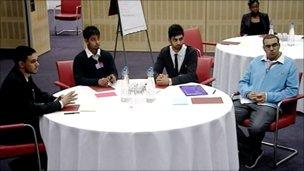Social mobility: Less privileged face fight for top jobs
- Published
Social mobility has been declining in Britain since the 1950s. So what can the brightest young people from less privileged backgrounds do to break into the professions?
Baharak Zargarei is a girl with ambition. She is a hairdresser's daughter from east London but she wants more.
Her exam results are great and so are her plans.
"Getting these grades means that I have a better option of getting to a good university, and with that comes a good career."
Baharak's two best subjects are maths and economics. At 17 years old, she is a perfect candidate for a career in finance. But that means breaking into the City - and that is a whole new world.

Baharak spent a week at Barclays on a scheme aimed at improving access
It is claimed that three out of four city finance directors were privately educated. Baharak went to a state school. She has no contacts in the City and no role models.
This is where social mobility, the opportunity for children to do better in life than their parents, grinds to a halt, says David Johnstone from the Social Mobility Foundation. Ambition gets working-class children only so far.
"You haven't had work experience, you haven't had mentoring - you come out and you're trying to compete with children from middle-class families and it's very difficult for you," he says.
Soft skills
Middle-class parents can provide the key to contacts in the professional world and the chance of work experience. The foundation is behind a scheme designed to unlock a few doors for them. Baharak and 11 other teenagers spent a week at the Barclays Global HQ in the heart of the City. Each student was given a mentor for a week and the chance to learn about what the company expects from its recruits.
"The demands today of jobs require skills much broader than pure academic excellence," says Cathy Turner, head of HR for Barclays. "For example, tenacity, creativity, communication skills, many of what people sometimes term the softer skills."
Barclays is trying to improve access. By the end of her week, Baharak looked at home in her new world, but there are currently only 12 places on the scheme compared with an overall workforce of 55,000 people.
When you look at the UK's top jobs, the statistics are grim. Only 7% of children are privately educated but more than half the top doctors went to private school. Seven in 10 judges and six in 10 barristers went to independent schools.
The former Labour cabinet minister, Alan Milburn, wrote a ground-breaking report on social mobility for the last government, and now advises the current government on the same issue.
"Birth, not worth, has become more and more a key determinant of people's life chances," says Mr Milburn. "That trend is getting worse."
He sees it as a lost resource, saying we can ill afford to rule out huge slices of the population, particularly at a time of economic hardship.
"Labour is king in the modern world. If you're not using everybody's labour to the maximum of their ability, that is bad for them, but it's also holding the country back."
Boot camp
Among those trying to increase social mobility is Liverpool University. It is offering a crash course in the soft skills that a private education provides.
In a row of small booths, students are paired with tutors to learn the hidden rules of networking. At the end of fake interviews, they are given their feedback - no matter how brutal.
"Your answers were a little long and rambling in places," one is told. "Thirty five per cent of the interview is about how you come across."
The man behind the soft-skills boot camp is Paul Redmond. "It's knowing how to dress, knowing how to behave, knowing how to talk, the kind of small talk that you might have in an employers selection centre can all play a part in graduate recruitment."
So how did we end up in a position where social mobility is poor and worsening? Well, it hasn't always been like this. The middle of the last century was the golden age of social mobility. Grammar schools were the engines of change. It was a ruthless system - three children rejected for every one that got through, but once you were in, you were encouraged to aim high.
From there, things slipped. If you were born to an average family in 1958, you were more likely to get a job in the professions when you grew up than someone arriving just 12 years later, in 1970.
But the economic decline of the 80s provided the key moment - the fork in the road. In that decade, the gap between rich and poor widened by 60%. Those with good jobs could provide for their families, those without fell behind.
Different world
David Morley has seen what is possible. Thirty years after he left his state school, he is a senior partner at a City law firm.
"When I discovered that it actually got harder for people from average or below-average-income families to get into the professions than it was when I entered the law 30 years ago, I was just astonished and appalled by that," he says.

Flip charts and presentations... students get a taste of professional life
So he has designed a scheme that gets 20 young people into the company, teaches them the art of networking and raises their sights.
There is roleplay, challenges and a chance to spend time with lawyers. David says this is not charity - everyone wins if we broaden the range of people entering the professions.
"We don't want to have a single gene pool of people from only one particular background. If every major firm had a structured work experience scheme then I think that could have a really dramatic impact on the problem."
Solutions are hard, and harder still to spot. It will take the progress of a generation to see what differences changes like greater university access have made. For Alan Milburn the test is simple - to stop young people ruling themselves out.
"What makes me, I suppose, sad and angry in equal measure is what I call a 'not for the likes of me' syndrome - where I talk to groups of kids and they say, 'Well, you know, maybe I could become a doctor, a lawyer or a journalist, but that's not really for the likes of me'."
Richard Bilton investigates Who gets the best jobs? on BBC Two at 2100 GMT on Wednesday 2 February.
- Published18 January 2011
- Published26 January 2011
- Published26 January 2011